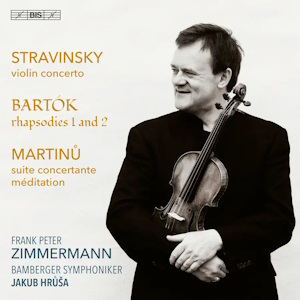
Igor Stravinsky (1882-1971)
Violin Concerto in D (1931)
Béla Bartók (1881-1945)
Rhapsody No.1, BB 94b (1928 rev 1929)
Rhapsody No.2, BB 96b (1928 rev 1935)
Bohuslav Martinů (1890-1959)
Suite concertante, H 276 II, second version (1944)
Méditation, second movement of the first version (1939)
Franz Peter Zimmermann (violin)
Bamberg Symphony Orchestra/Jakub Hrůša
rec. 2021/22, Joseph-Keilberth-Saal, Konzerthalle, Bamberg, Germany
BIS BIS2657 SACD [69]
Over two years ago Franz Peter Zimmermann and the Bamberg Symphony under Jakub Hrůša released their recording of the two Martinů concertos, coupled with Bartók’s solo sonata (review), performances I found immensely satisfying. Now they reprise the two composers adding Stravinsky’s Violin Concerto. This time they turn to the Suite concertante, H 276 and both Bartók Rhapsodies adding by way of an encore of sorts the Méditation from the first version of the Suite.
When it comes to the Stravinsky, Zimmermann offers competition to his more than three decades younger self. Back in 1990 he recorded the concerto with the Stuttgart Radio Symphony and Gianluigi Gelmetti, a recording lately restored in the big 30-CD Warner box devoted to the violinist’s EMI legacy (review). Here with Hrůša tempi are similar though very slightly tighter. The main difference is that the Bamberg play with a more incisive and sharper etched profile and the soloist similarly. If that means that he is a touch less overtly expressive in the Aria I and rather more astringent throughout than in his older performance, compensation comes in the crispness and precision of the corporate playing. The Bamberg sounds a more compact orchestra than the Stuttgart Radio but its clarity is a point in its favour.
I was less impressed by Bartók’s Rhapsodies. They are played with commendable directness and clarity once again, but they lack a sense of ethnic coloration. Intonation is spot-on and bowing is co-ordinated with wonderful resilience but where is the tang, vibrancy and emotive richness conjured up by Gertler and Ferencsik in their old Brno Philharmonic recording?
Martinů’s Suite concertante was composed in 1944 and shares similarities with the Stravinsky, not least because the Czech composer copied the same movement indications in the first two movements – Toccata and Aria. Both concertos were also written for Samuel Dushkin. The Suite concertante exists in two versions. The earlier version was premiered in violin-and-piano form and was a disappointment. The version performed here is the second version. I’m not quite sure what the booklet notes mean when they say that ‘this album features this second version’s third movement, entitled Méditation’. Surely, it’s the second movement of the first version, as indicated in the track listing?
In any case this work hasn’t been well served on disc and the only other recording I know is by Bohuslav Matoušek and Christopher Hogwood with the Czech Philharmonic. Once again, Zimmermann and Hrůša take faster tempi. The violinist’s tone is more focused and crystalline than Matoušek’s – rather more Stravinskian, as it were. Together, Zimmermann and Hrůša ratchet the tension in the opening Toccata. Matoušek and Hogwood are slightly less pressing and the Czech violinist’s tone is rather warmer than Zimmermann’s. Of the two orchestras it’s the Czech Phil that evinces the more personality and of the two violinists whilst Zimmermann is instrumentally excellent, he sounds a touch straitlaced next to Matoušek, and somewhat lacking in the Czech player’s excavation of quirky moments of humour. Martinů completists will need both recordings but if you put me against a wall, I’ll take Matoušek.
The Méditation is a worthwhile piece to present contextually. It possesses the kind of expressive ardour that the second version doesn’t and though the composer tests the soloist in the highest positions, Zimmermann sails through these tests, and the late-Romanticism of the writing, with genuine warmth intact.
I listened to this hybrid SACD on a CD player.
Obviously, I was less impressed by this disc than its companion that coupled both Martinů concertos. It’s not badly played at all. On the contrary the performances and recording quality are both fine. Perhaps it’s my imagination but the Stravinsky, which was recorded last, in September 2022, seems to have led interpretatively and tonally to a neo-classic clarity that doesn’t suit the Bartók Rhapsodies and which sounds too heartless in the Martinů.
Jonathan Woolf
Help us financially by purchasing from




















